
During the five years between blue belt and purple belt, I was the enforcer in the classroom.
If you’re a sports fan, you know that in hockey, the enforcer’s function is pressure and intimidation. His role is to set a precedent with the other teams: he sits on the bench and when things get sticky, they roll him out and he smashes someone. Then they put him back in the line.
The enforcer doesn’t back down from a fight. And that was me, but in a gi.
Anyone who came into the dojo and was deemed an opposing force got hurt because that was my role. And I took it on with pleasure. I was proud of it.
Now, I’m embarrassed by it.
Why?
I realized something important after those five years. I realized that I was relying on my size, my physical force and my aggression to solve the problems that people of intellect were easily solving technically.
So instead of getting the respect of my peers during that time, as I thought my aggressive force would yield, what I got was ridicule. You know the score. Eventually, I was labeled as a “heavy,” a brute, and was dismissed.
A long time passed before I was able to get out of the mindset of combativeness and contentiousness, and back to a place where I could trust intelligence and reason. So much time, in fact, that it seemed like the rest of the Jiu-Jitsu community had passed me by.
Listen: many of us use force to get our way, not just in Jiu-Jitsu but in life. And while you’re forcing your way into solutions, do you know what intelligent people are doing? They’re ridiculing you – whether right to your face or behind your back. They’re condemning your methods because most of them understand that force is a ridiculous attempt at resolving challenges.
My ego took the bait. I fell for the idea that strength meant physical force. Now, alternatively, I advocate students to relax, to think, and above all to find principle-based solutions.
I’ve been there. Now, part of my mission, my hope, is for others to not have this experience of short-term benefit and long-term loss.
There’s a way to experience Jiu-Jitsu as a vehicle through which you discover your real strength and fortitude in intelligence and right-reasoning; your real ability to problem-solve without force.
It’s out of respect and love for the training, for everyone who is a student of the martial arts, that I say, use this chance to think more and deepen your understanding.
So what does all this mean? Find an alternative to forcing your way. Once you do, it will be a true strength beyond measure, and you just may find yourself relevant, present, and respected.
– Gene Dunn & Foundation of Love
For more about our larger project of cooperative Jiu-Jitsu and martial arts training, please visit the
Brooklyn Brazilian Jiu-Jitsu (Brooklyn BJJ) website here.
thanks you for this story. i see how cocky people can be not just in strength and size and alao in training sense but as well as walking down the block also the way they do different sports. . im smaller and skinnier than most . so everyone thinks they can beat me until they actually face me . i leraned to harness more technique to bring out explosive power right after . thanks to my teacher. professor noto. I haven’t been to class in so long time . but wish I could be there. anyways . I really enjoy reading the different stories and receiving blogs thru my email. thanks professor Dunn. keep up good work and love to train . bless you all. usss!
Dear Shihan, Most excellent post. Very glad to read it! About the book of Montaigne’s Essays– please don’t take it as an imposition. I have the impression you like maxims, succinct stories, wisdom, and Montaigne shares that with you. Also, he is a great guy as are you. While one can read the three books of essays from cover to cover, one can also open to a random page and just read a paragraph. That second method is perfectly fine. He has a kind of rambling, conversational style, is the reason why. And a paragraph here, and six months later another, that is also good. You have a really great mind and I enjoy and appreciate what you say in class very much. I hope Montaigne becomes your friend, as he has become for so many others. All the best! See you soon! PS “Essai” in French means “attempt”. He invented the form. So these are his attempts. Gives one the sense of his humility…